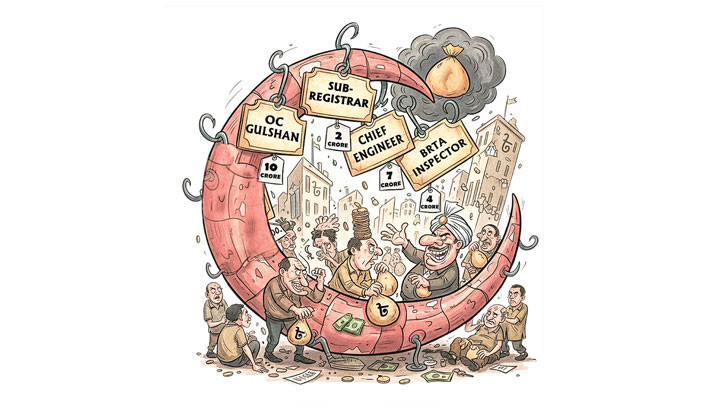WAYS TO STOP THE TRANSFER BUSINESS – PART I
Money exchanged for transfers – the goal is corruption
Special Correspondent, Dhaka
Published: 15 Nov 2025

“I am sitting in this chair with Tk10 crore. Without money, nothing will happen.”
This is not a line from a drama or a film, but the brazen admission of a senior official at a key public service agency. Many citizens encounter similar attitudes when seeking services at government offices.
One of the driving forces behind Bangladesh’s entrenched corruption is the transfer trade. From the highest ranks to the lowest, officials and staff often pay hefty sums to secure postings of their choice – with some coveted positions reportedly selling for crores of taka.
Officials who obtain transfers by paying large sums see their first task as recovering the investment. After that, they focus on securing their own future.
An investigation by this correspondent has revealed that from secretaries to low-level employees, one has to pay bribes to obtain lucrative positions. Even ordinary employees have to offer bribes to be transferred to desirable posts.
In government service, there are certain positions where it is impossible to get transferred without paying money. The price of a post also varies depending on the area. The investigation identified at least 25 such positions where transfer is impossible without payment.
Recently, a survey has identified the most corrupt government organisations.
According to the “Citizen Perception Survey (CPS) Preliminary Report 2025”, conducted by the Bangladesh Bureau of Statistics (BBS), the Bangladesh Road Transport Authority (BRTA) is the most corrupt government agency.
In February 2025, a nationwide survey was conducted by the BBS. According to the findings, 31.67% of citizens who accessed government services in the past year reported being victims of bribery and corruption, with 38.62% of men and 22.71% of women affected. Among government service organisations, the highest incidence of bribery and corruption was found in BRTA (63.29%), law enforcement agencies (61.94%), passport offices (57.45%), and land registration offices (54.92%).
However, somewhat different data have emerged from Transparency International Bangladesh’s (TIB) “9th Household Survey on Service Sector Corruption”.
According to this survey, 70.9% of households have been victims of corruption. The study identified law enforcement agencies as the most corrupt sector, followed by the passport and BRTA sectors.
Moreover, 72.1% of households that paid bribes cited “no service without a bribe” as the reason, demonstrating that bribery has become institutionalised. On average, households paid Tk6,636 in bribes, with the total estimated nationwide bribe amount reaching about Tk10,830.1 crore.
TIB’s analysis further shows that the most corrupt sectors are law enforcement agencies (74.4%), passport services (70.5%), BRTA (68.3%), judicial services (56.8%), healthcare (48.7%), local government institutions (46.6%), and land services (46.3%).
These institutions also have several lucrative posts for which large sums must be paid to obtain appointments.
One of the most corrupt sectors in the country is law enforcement. Corruption here is mainly centred around police stations. In the past, to secure a position as officer-in-charge (OC) in elite areas like Gulshan, Banani, and Dhanmondi, one had to pay between Tk10 crore and Tk15 crore. According to insiders, the situation has not changed much. It is not only the OC positions – even a constable’s post in these police stations requires paying several lakh taka.
A police officer, wishing to remain anonymous, shared that those posted in Dhaka from outside the city have to pay anywhere from a few lakh to several crore taka, depending on the position. “How can a police officer remain honest after paying a bribe to get a position?” he asked.
Land offices are another major hub of bribery. The bribe amounts are particularly high for the Sub-Registrar post. These Sub-Registrars act as collectors in this sector – they directly collect money from the public, which is then distributed according to rank, all the way up to the top. Some specific Sub-Registrar posts are even auctioned off. To be appointed as a Sub-Registrar in areas like Gulshan, Gazipur, or Keraniganj, one needs several crore taka.
In departments such as the Forest Department, Public Works Department, Roads and Highways Department, and Local Government Engineering Department, higher-level positions are far more expensive than lower-level ones. In 2023, a chief engineer’s post was reportedly sold for a staggering Tk100 crore.
Even medical professionals’ transfers are part of this trade. A doctor must pay several lakh taka to be transferred to Dhaka.
When a person secures a position through bribery, their primary and only goal becomes corruption. This is how the vicious cycle of corruption continues in Bangladesh.

